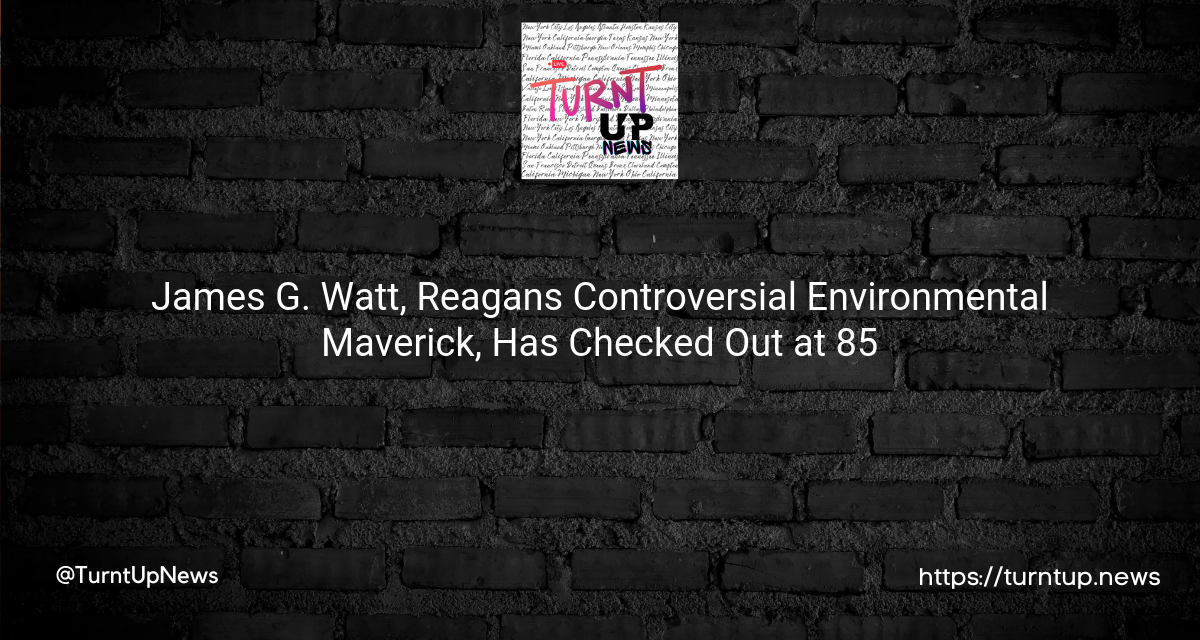🎙️James G. Watt, Reagan’s Controversial Environmental Maverick, Has Checked Out at 85🌲
TL;DR: James G. Watt, the notorious “fox in the hen house” who shifted the US environmental policy pendulum wildly towards commercial exploitation during his tenure as Ronald Reagan’s Interior Secretary, has finally hung up his spurs at 85.💼 His controversial decisions rocked the nation, sparking fiery debates over the fate of public lands. His unpredictability, eyebrow-raising statements, and ‘no holds barred’ approach left a significant mark on the US environmental landscape.🏞️
In 1981, Mr. Watt stepped onto the national stage, a fresh recruit from a Denver legal foundation notorious for challenging the rules and regulations of the very department he was now set to command. This appointment had critics raising their eyebrows, labeling him a “fox in the hen house.” 😲
His notorious response to a question regarding preserving wilderness areas would set the tone for his tenure. “I do not know how many future generations we can count on before the Lord returns,” he infamously remarked. So…are we prioritizing fossil fuels over fossil records, then? 🤔
Watt’s belief system extended beyond his evangelical Christian faith into his professional realm, transforming the Department of Interior into his ‘holy’ mission. His actions, however, landed him in hot water more often than not, as he publicly took potshots at liberals, the Beach Boys, and just about everyone else he disagreed with. Who knew stewardship of public lands could be such a riot? 🎪
During his tenure, Watt accused “environmental extremists” of holding back economic growth and national security. So, the solution? Unleash control of public resources to private industry. Who needs wilderness when we can have wealth, right? 💸
Watt’s policies, unsurprisingly, brought him a considerable amount of backlash. Environmental groups didn’t take kindly to Watt’s sweeping changes and organized petitions demanding his removal. His strategy to sell federal lands to reduce national debt was thwarted due to overwhelming opposition. Seems like the public wasn’t quite ready to swap their trees for treasuries. 🌳💔
Regardless of his controversial career, there were those who lauded Watt’s efforts. He found support among conservative and Western Republicans and was even hailed as “the best secretary of the Interior.” All this leads us to ask: can radical, divisive leadership sometimes produce effective results? And at what cost? 🤷♀️
In the end, however, his unyielding style and controversial statements eventually led to his downfall. His assertiveness turned comic when he banned women’s pantsuits in his department but was blatantly ignored. He even reversed the bison on the department logo to face right, signifying his political leanings. 🦬➡️
Watt’s polarizing legacy continues to influence discussions about public land use, environmental conservation, and the role of government in preserving natural resources. As we look back, we’re left wondering: was James G. Watt a destructive force or a necessary evil, a shake-up that the Department of Interior needed at the time? And ultimately, what lessons can we learn from his time in office? 🔍
This is a news report and does not provide any advice or endorsements. All information is based on publicly available data and statements.





